heidegger's being and time and national socialism - Philosophy ...
heidegger's being and time and national socialism - Philosophy ...
heidegger's being and time and national socialism - Philosophy ...
Create successful ePaper yourself
Turn your PDF publications into a flip-book with our unique Google optimized e-Paper software.
128. In the lecture course An Introduction to Metaphysics<br />
in summer 1935, Heidegger adopts Kurt Riezler’s<br />
Parmenides interpretation from 1934, in which<br />
Riezler made his suggestion regarding the question<br />
who were the Greeks that we were supposed to repeat.<br />
Riezler used Heidegger’s notion of truth to interpret<br />
Being in Parmenides as that which holds together<br />
the opposites <strong>and</strong> thus maintains, or produces,<br />
an Ausgleich between right <strong>and</strong> left (similar to the<br />
way in which Scheler after his turn <strong>and</strong> Tillich dem<strong>and</strong>ed<br />
a politics of Ausgleich; see Fritsche, Historical<br />
Destiny <strong>and</strong> National Socialism, 142–48,<br />
173–87). Thereafter Heidegger makes the first chorus<br />
in Sophocles’ Antigone talk about the conscienceless<br />
revolutionaries, <strong>and</strong> uses his Sophocles<br />
interpretation to turn his <strong>and</strong> Riezler’s Parmenides<br />
interpretation upside down <strong>and</strong> find in Parmenides<br />
his notion of historicality, according to which the<br />
sphere of Ausgleich, society, is, as the sphere of<br />
Schein (seeming), that opposite which has to be destroyed<br />
in the name of the re-realization of the other<br />
opposite, community, which includes rank as opposed<br />
to the egalitarianism of society. See ibid.,<br />
200–01; Johannes Fritsche, “Heidegger in the Kairos<br />
of ‘the Occident,’” The Graduate Faculty <strong>Philosophy</strong><br />
Journal 22 (1999): 3–19.<br />
129. Heidegger, Being <strong>and</strong> Time, 436; Sein und Zeit, 384.<br />
130. Fritsche, Historical Destiny <strong>and</strong> National Socialism,<br />
47, 55–60.<br />
131. Ibid., 134, 349–51n24; see below, last section.<br />
132. Heidegger, Being <strong>and</strong> Time, 318–19, 342; Sein und<br />
Zeit, 273–74, 296.<br />
133. See above, n. 21.<br />
134. Heidegger, Being <strong>and</strong> Time, 54; Sein und Zeit, 31.<br />
135. Heidegger, Being <strong>and</strong> Time, 219; Sein und Zeit, 175.<br />
136. Heidegger, Being <strong>and</strong> Time, 326; Sein und Zeit, 281.<br />
137. Heidegger, Being <strong>and</strong> Time, 335–41; Sein und Zeit,<br />
289–95.<br />
138. Heidegger, Being <strong>and</strong> Time, 348; Sein und Zeit, 301.<br />
139. See the reference to the problem in the first section of<br />
the chapter on historicality (Heidegger, Being <strong>and</strong><br />
Time, 424–29; Sein und Zeit, 372–77).<br />
140. Heidegger, Being <strong>and</strong> Time, 434; Sein und Zeit, 382.<br />
141. Fritsche, Historical Destiny <strong>and</strong> National Socialism,<br />
xii.<br />
142. Heidegger definitely knew Scheler but most probably<br />
also Tönnies <strong>and</strong> other texts.<br />
143. Löwith’s interpretation from 1948 was published<br />
only in the USA (see Fritsche, “From National Socialism<br />
to Postmodernism,” 105).<br />
PHILOSOPHY TODAY<br />
282<br />
144. See above, n. 21.<br />
145. Fritsche, Historical Destiny <strong>and</strong> National Socialism,<br />
47, 55–60, 140–42, 289–92n66 <strong>and</strong> passim.<br />
146. At Pennsylvania State University in 2002, a graduate<br />
student who had come there because of John Sallis<br />
<strong>and</strong> Charles Scott wanted to write his course paper<br />
on Aristotle’s theory of knowledge to show, as he put<br />
it, that Aristotle was not yet entangled in the subjectobject<br />
split. Especially since he was not particularly<br />
familiar with Aristotle <strong>and</strong> had not yet read On Soul,<br />
I recommended him to be very cautious regarding the<br />
notoriously dark chapters 4 <strong>and</strong> 5 of Book III. His<br />
paper culminated in statements about sentences from<br />
these very chapters. I explained to him at great length<br />
that these sentences could mean many things but precisely<br />
not what he claimed. In the second draft of his<br />
paper, he had not changed anything except that he<br />
had added that, at that point, Aristotle had used the<br />
wrong words. When I asked him whether he knew<br />
Greek, he answered in the negative. When I explained<br />
to him that his procedure was not appropriate,<br />
he began crying <strong>and</strong> complained that I challenged<br />
his “academic integrity.”<br />
147. Ibid., 174–75.<br />
148. Ibid., 323n57. Even after his reassessment of<br />
Heidegger’s philosophy, John D. Caputo repeats a<br />
postmodern interpretation in which the Parisian<br />
deconstructive mood happily merges with the American<br />
idol of the self-made man: “Dasein gives itself a<br />
fate.” Demythologizing Heidegger (Bloomington:<br />
Indiana University Press, 1993), 81.<br />
149. Ibid., 11.<br />
150. Ibid., 1, 16, 36–38.<br />
151. Fritsche, Historical Destiny <strong>and</strong> National Socialism,<br />
197–203, 216–224.<br />
152. Heidegger, Being <strong>and</strong> Time, 265; Sein und Zeit, 222;<br />
see—also for the details of the full quote (“always, as<br />
it were, a kind of robbery”)—Johannes Fritsche,<br />
“With Plato into the Kairos before the Kehre: On<br />
Heidegger’s different Interpretations of Plato,” in C.<br />
Partenie <strong>and</strong> T. Rockmore, eds., Heidegger <strong>and</strong><br />
Plato: Toward Dialogue (Evanston: Northwestern<br />
University Press, 2005), 140–77, here 144–46; even<br />
<strong>and</strong> especially in An Introduction to Metaphysics the<br />
Greeks are adventurous conquerors but now they are<br />
so because they obey a call (ibid., 148–49).<br />
153. Ibid., 144–46.<br />
154. Ibid., 143 (also in §6 of Being <strong>and</strong> Time the prevalent<br />
tone is that the tradition between us <strong>and</strong> the Greeks<br />
has to be destroyed to release the Greeks <strong>and</strong> regain
















